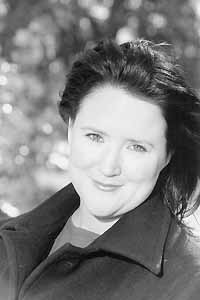
introducing readers to writers since 1995
April 17, 2005
Author2Author: Helen Ellis & Joshilyn Jackson, conclusion
by Ron Hogan
 Helen Ellis (left): In gods in Alabama, a lot of pains are taken by characters to hide what has happened to them to spare others' feelings. (I'm thinking in particular about what is hidden from Arlene's aunt, and being intentionally vague so as not to give away too much plot.) You often read about women who pretend bad things never happened to them for their own sanity, but in this case, the charade was created to save the aunt from pain that she' d feel over what happened to someone else. Do you get what I'm asking? Why don't people share their deepest pain with the ones who love them most?
Helen Ellis (left): In gods in Alabama, a lot of pains are taken by characters to hide what has happened to them to spare others' feelings. (I'm thinking in particular about what is hidden from Arlene's aunt, and being intentionally vague so as not to give away too much plot.) You often read about women who pretend bad things never happened to them for their own sanity, but in this case, the charade was created to save the aunt from pain that she' d feel over what happened to someone else. Do you get what I'm asking? Why don't people share their deepest pain with the ones who love them most?
Joshilyn Jackson (right): It's hard to answer this without, as you said, explicating the plot. I think everyone is this book is more loved than they think they are. Arlene certainly is. (At this point, I need Doctor Phil to step in looking moist and sincere and say in a rich, fruity voice, "Part of being loved is accepting the idea that you deserve it!" Then we could all hug.)
But I think this question is actually connected to what we were talking about earlier: You know, early in the book Arlene's descriptions dovetail with the descriptions of Chicago. She's all angles and corners, much too tidy to be anything but meticulously planned. As she goes south, that changes. She doesn't stay Chicago Lena, but she doesn't revert to being the out-of-control Arlene who at fifteen crept up to the top of Lipsmack Hill to beat a boy to death with a tequila bottle. Lena at the beginning is a tightly wound wad of secrets that is dying to explode and unravel and confess. But for the Arlene she has become by end of the book, part of loving is knowing what secrets to keep, even if witholding them costs her a piece of her own absolution. I'd like to argue this one with you sometime, because I do believe she makes the correct choice. And yes, by correct, I mean I think she is doing what is right, even if it is perhaps ethically bankrupt.
This whole conversation makes me want to talk about the rather disturbing end of Eating the Cheshire Cat, but without somehow summarizing the entire plot. One of your main characters makes a very final choice that I didn't think was morally or ethically right, but I couldn't help but find it terribly satisfying. Do you think she was justified, or does that matter?
Helen Ellis: Aren't we the little devils; we do both hurt our characters in peculiar over-the-top ways. Perhaps this is because, being raised as southern ladies, our violent tendencies were so repressed by society or blamed on our periods.Nope, I don't think the girl who causes the big bang at the end of the novel was ethically right, but it is a happy ending in my mind. What this character learned, we all learn: Life isn't fair. So she took justice and karma into her own hands and rubbed them like two stick to start a fire. BOOM!
If there's one thing I regret with that book, it is the title. Number one, nobody can understand my accent when I say it and everyone asks me to repeat myself. "Doin' what with the what-what?" Number two, it was just too clever for my own good. The title stems from the scene in Alice in Wonderland in which the cheshire cat taunts Alice: "You must be crazy or you wouldn't have come here." In my mind, the book and the finale to which you refer are about taking a bite out of your antagonizer's ass. But nobody gets it.
A newspaper editor and friend of my husband gave me this advice: "When writing, put the dog food where the dog can see it." In other words, make it easy on the reader. He suggested the title for my next book: How I Killed My Husband and Got Away With It: An Autobiography.
your PayPal donation
can contribute towards its ongoing publication.